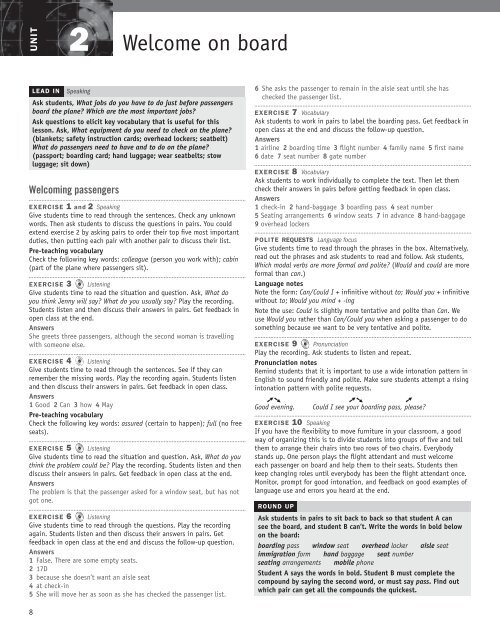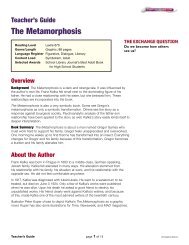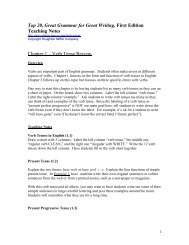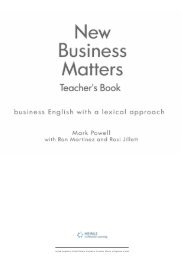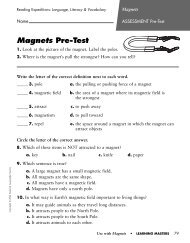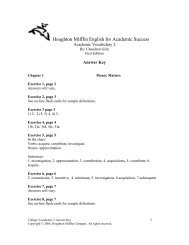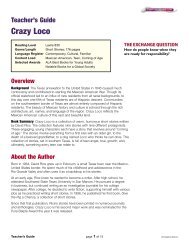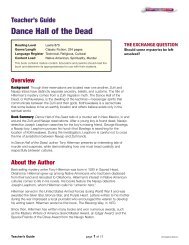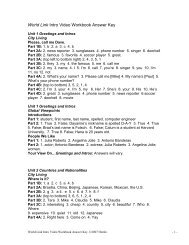English for Cabin Crew Trainer's Guide - Heinle
English for Cabin Crew Trainer's Guide - Heinle
English for Cabin Crew Trainer's Guide - Heinle
You also want an ePaper? Increase the reach of your titles
YUMPU automatically turns print PDFs into web optimized ePapers that Google loves.
UNIT<br />
2 Welcome on board<br />
LEAD IN Speaking<br />
Ask students, What jobs do you have to do just be<strong>for</strong>e passengers<br />
board the plane? Which are the most important jobs?<br />
Ask questions to elicit key vocabulary that is useful <strong>for</strong> this<br />
lesson. Ask, What equipment do you need to check on the plane?<br />
(blankets; safety instruction cards; overhead lockers; seatbelt)<br />
What do passengers need to have and to do on the plane?<br />
(passport; boarding card; hand luggage; wear seatbelts; stow<br />
luggage; sit down)<br />
Welcoming passengers<br />
EXERCISE 1 and 2 Speaking<br />
Give students time to read through the sentences. Check any unknown<br />
words. Then ask students to discuss the questions in pairs. You could<br />
extend exercise 2 by asking pairs to order their top fi ve most important<br />
duties, then putting each pair with another pair to discuss their list.<br />
Pre-teaching vocabulary<br />
Check the following key words: colleague (person you work with); cabin<br />
(part of the plane where passengers sit).<br />
EXERCISE 3 Listening<br />
Give students time to read the situation and question. Ask, What do<br />
you think Jenny will say? What do you usually say? Play the recording.<br />
Students listen and then discuss their answers in pairs. Get feedback in<br />
open class at the end.<br />
Answers<br />
She greets three passengers, although the second woman is travelling<br />
with someone else.<br />
EXERCISE 4 Listening<br />
Give students time to read through the sentences. See if they can<br />
remember the missing words. Play the recording again. Students listen<br />
and then discuss their answers in pairs. Get feedback in open class.<br />
Answers<br />
1 Good 2 Can 3 how 4 May<br />
Pre-teaching vocabulary<br />
Check the following key words: assured (certain to happen); full (no free<br />
seats).<br />
EXERCISE 5 Listening<br />
Give students time to read the situation and question. Ask, What do you<br />
think the problem could be? Play the recording. Students listen and then<br />
discuss their answers in pairs. Get feedback in open class at the end.<br />
Answers<br />
The problem is that the passenger asked <strong>for</strong> a window seat, but has not<br />
got one.<br />
EXERCISE 6 Listening<br />
Give students time to read through the questions. Play the recording<br />
again. Students listen and then discuss their answers in pairs. Get<br />
feedback in open class at the end and discuss the follow-up question.<br />
Answers<br />
1 False. There are some empty seats.<br />
2 17D<br />
3 because she doesn’t want an aisle seat<br />
4 at check-in<br />
5 She will move her as soon as she has checked the passenger list.<br />
8<br />
6 She asks the passenger to remain in the aisle seat until she has<br />
checked the passenger list.<br />
EXERCISE 7 Vocabulary<br />
Ask students to work in pairs to label the boarding pass. Get feedback in<br />
open class at the end and discuss the follow-up question.<br />
Answers<br />
1 airline 2 boarding time 3 fl ight number 4 family name 5 fi rst name<br />
6 date 7 seat number 8 gate number<br />
EXERCISE 8 Vocabulary<br />
Ask students to work individually to complete the text. Then let them<br />
check their answers in pairs be<strong>for</strong>e getting feedback in open class.<br />
Answers<br />
1 check-in 2 hand-baggage 3 boarding pass 4 seat number<br />
5 Seating arrangements 6 window seats 7 in advance 8 hand-baggage<br />
9 overhead lockers<br />
POLITE REQUESTS Language focus<br />
Give students time to read through the phrases in the box. Alternatively,<br />
read out the phrases and ask students to read and follow. Ask students,<br />
Which modal verbs are more <strong>for</strong>mal and polite? (Would and could are more<br />
<strong>for</strong>mal than can.)<br />
Language notes<br />
Note the <strong>for</strong>m: Can/Could I + infi nitive without to; Would you + infi nitive<br />
without to; Would you mind + -ing<br />
Note the use: Could is slightly more tentative and polite than Can. We<br />
use Would you rather than Can/Could you when asking a passenger to do<br />
something because we want to be very tentative and polite.<br />
EXERCISE 9 Pronunciation<br />
Play the recording. Ask students to listen and repeat.<br />
Pronunciation notes<br />
Remind students that it is important to use a wide intonation pattern in<br />
<strong>English</strong> to sound friendly and polite. Make sure students attempt a rising<br />
intonation pattern with polite requests.<br />
➚➘ ➚➘ ➚<br />
Good evening. Could I see your boarding pass, please?<br />
EXERCISE 10 Speaking<br />
If you have the fl exibility to move furniture in your classroom, a good<br />
way of organizing this is to divide students into groups of fi ve and tell<br />
them to arrange their chairs into two rows of two chairs. Everybody<br />
stands up. One person plays the fl ight attendant and must welcome<br />
each passenger on board and help them to their seats. Students then<br />
keep changing roles until everybody has been the fl ight attendant once.<br />
Monitor, prompt <strong>for</strong> good intonation, and feedback on good examples of<br />
language use and errors you heard at the end.<br />
ROUND UP<br />
Ask students in pairs to sit back to back so that student A can<br />
see the board, and student B can’t. Write the words in bold below<br />
on the board:<br />
boarding pass window seat overhead locker aisle seat<br />
immigration <strong>for</strong>m hand baggage seat number<br />
seating arrangements mobile phone<br />
Student A says the words in bold. Student B must complete the<br />
compound by saying the second word, or must say pass. Find out<br />
which pair can get all the compounds the quickest.


